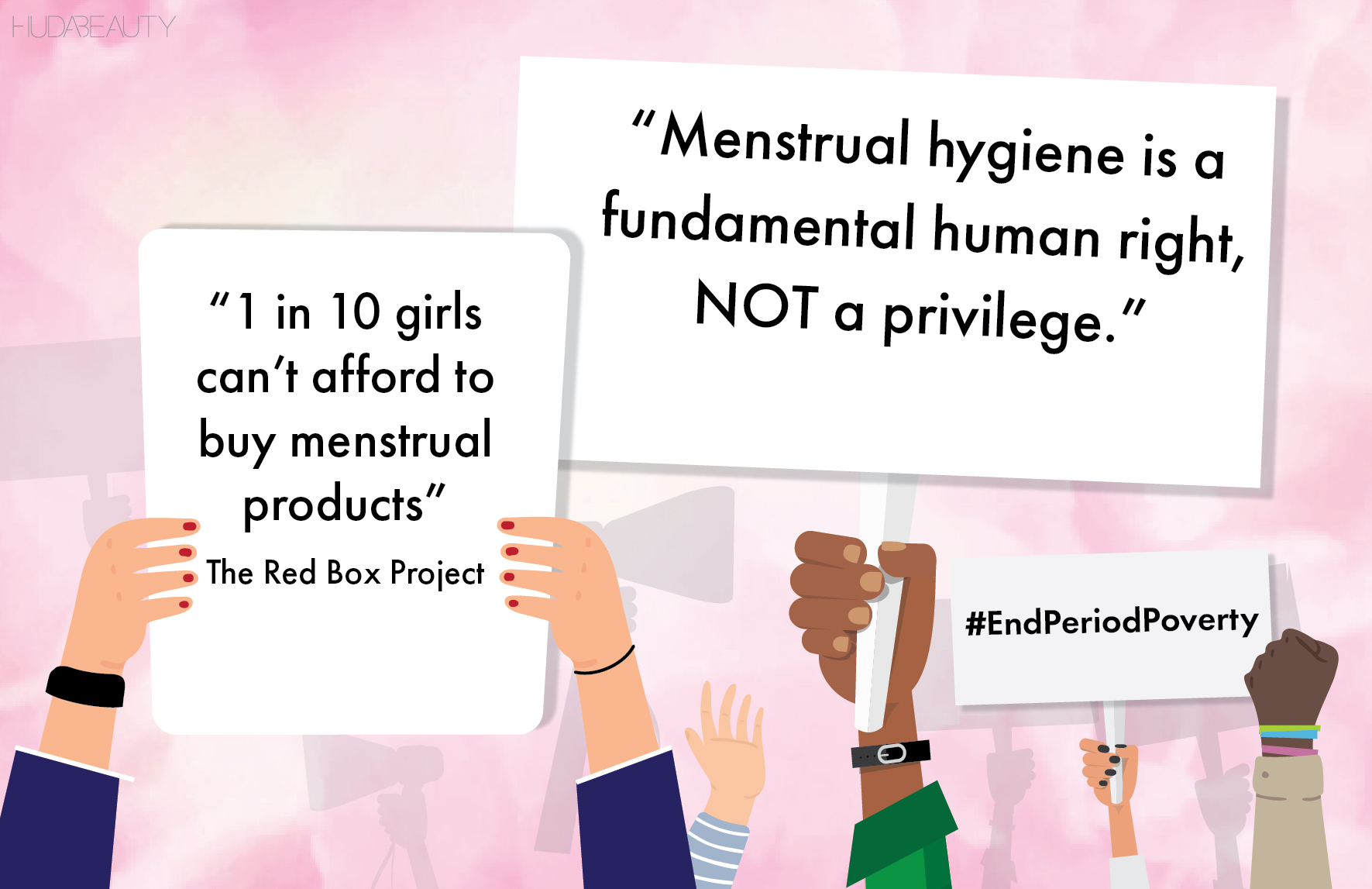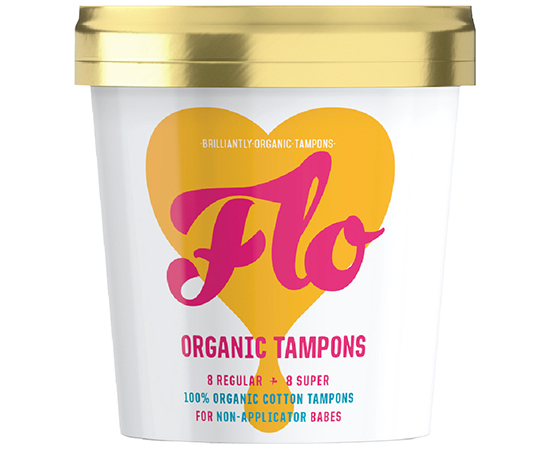Period Poverty: What You Need To Know & How You Can Help

In honor of Menstrual Hygiene Day, a day dedicated to raising awareness on period poverty and eliminating the stigma surrounding periods, we wanted to help spread the word in every way we can. In 2013, the first Menstrual Hygiene Day took place to raise awareness of these issues, and in 2021 amid a global pandemic, period poverty is only getting worse. Here’s everything you need to know and how you can help.
What is Period Poverty?
Period poverty is, by definition, the lack of access to sanitary products, menstrual hygiene education, toilets, handwashing facilities, and, or, waste management. Anyone who’s ever had a period will know the instant anxiety of realizing you’ve used the last tampon or pad in your purse, but for many women around the world, that’s an ongoing fear. What’s worse is that for millions of women, they’re left with no alternative other than to use unsanitary and toxic substitutes or are restricted to their house or bathroom for days.
View this post on Instagram
Period poverty is prevalent across the world, and according to Plan International UK, one in every ten teenage girls will have experienced the problem of not being able to afford sanitary products. While in the United States, in 2017, 26.4 million people couldn’t afford menstrual products. As it stands, according to PERIOD., nearly a quarter of students struggle to access period products, and the pandemic has only heightened barriers. Students of color, lower-income students, and rural students are most impacted by issues of access.
What is Menstrual Hygiene Day?
Known as MH Day, Menstrual Hygiene Day was initiated by the German non-profit WASH United, in 2013. For 2021, it has partnered with PERIOD. a youth-fueled non-profit organization. Together they aim to help spread awareness about period poverty, which is evidently an evergrowing problem.
If you’re thinking this sounds or feels familiar, PERIOD. also initiated the first National Period Day, which took place on October 19, 2019. Spearheaded by PERIOD. they organized rallies across the world, and while every rally was unique, they all shared (and shouted) the same message – menstrual hygiene is a right, not a privilege. Brands like Tampax, Thinx, and Planned Parenthood got involved with organizations, including the In Her Shoes Foundation, Gen Z Girl Gang, and the Female Quotient to spread the word.
Posts You'll Love:
How to Get Involved with Menstrual Hygiene Day
If you want to get involved and give back, there are some amazing charities that distribute menstrual products to those in need, educate women on menstrual hygiene, and also break down the shame and stigma surrounding periods. Here are some charities to support now and forever…
PERIOD.
View this post on Instagram
PERIOD. is a youth-fueled nonprofit that strives to eradicate period poverty and stigma through service, education, and advocacy. Not only does it distribute menstrual products to those in need, but it also promotes leadership and champions for systemic change. If you donate to PERIOD. 100% of donations go directly to helping supply menstruators in need with essential period supplies. You can also join their network and support the cause in your local community by becoming a PERIOD. chapter (find out more deets here).
Freedom4Girls
View this post on Instagram
Tina Leslie founded Freedom4Girls with the aim to send menstrual products to women in Kenya, but soon realized she didn’t even have to look outside of the UK to find people in need of menstrual products. Today, the UK-based organization provides education on product choice, supporting environmentally and financially sustainable options, as well as providing period products to those in need. You can get involved by donating money, period products, or even your time by attending one of their monthly sewing workshops.
Support the Girls
View this post on Instagram
Support the Girls is a nonprofit whose mission statement says it all… “People shouldn’t have to choose between feeding themselves and their personal health.” We couldn’t agree more. Now, the organization donates bras and menstrual products to homeless people across the USA. There are a number of ways to get involved with Support the Girls – you can donate money, bras, menstrual products, or even set up a donation drive in your local community.
Days for Girls (DfG)
View this post on Instagram
Like other organizations fighting period poverty, Days for Girls provide reusable menstrual products for girls in need. It all began when the Founder and CEO, Celeste Mergens, discovered that young girls in an orphanage she visited in Kenya, would sit on cardboard for several days each month during their period, sometimes going without food unless someone brought it to them. She created Days for Girls with the aim to provide period products to Every Girl. Everywhere. Period. Days for Girls have also developed their own menstrual product kits. To join the cause you could create a Days for Girls club at your school, donate products, or organize a fundraiser!
Binti
View this post on Instagram
Binti currently works in India, Africa, the UK, and the US, sharing three core aspects of their menstrual dignity mission: access (providing sanitary products), education about menstruation and what to expect, and de-stigmatization. They’re currently looking for editors, mentors, and health providers to help fight their important cause.
Menstrual Brands That Give Back
Another easy way to get involved is by supporting brands that give back. If you’re one of the privileged women who have easy access to sanitary products, instead of heading to the nearest drugstore, consider purchasing products from these brands that give back to women less fortunate.

Flo Tampons and Pads, $6-14: Flo makes sanitary products including tampons, pads, and liners out of natural, plant-based, biodegradable, and hypoallergenic materials like organic cotton and bamboo. The company donates its products to fight period poverty in the UK through the Red Box Project and provides menstrual products for asylum seekers and the homeless via Bloody Good Period.

Freda Organic Pantyliners, Tampons, and Pads, $12-20: Freda Organic is another amazing menstrual care brand that offers up non-toxic chemical-free products without compromising on protection or comfort. Their pads contain 100% eco-friendly and renewable materials and their tampons are made of 100% certified organic cotton and are biodegradable, hypoallergenic, and free from any nasty chemicals. To make it even better, a portion of every purchase is donated to worldwide initiatives tackling period poverty.

Thinx Period Underwear, $32-$40: Thinx offers a solution to tampons and pads that’s both practical, eco friendly, and dollar-saving. The solution? Period undies that hold up to 4 tampons’ worth, yet they look and feel like regular underwear. Plus, when you purchase Thinx you’re helping give life to one of their incredible initiatives such as The EveryBody education program, an inclusive curriculum designed by certified teachers and health experts to empower young women through menstrual health.
For more period-related posts, check out our guide to tampons, pads, and everything you should know about what to use on your period!
Disclaimer: Every product we review has been independently selected and tested without bias by our editorial team. We never take payment to review products, however, some brands allow affiliate links, so we may earn a commission if you purchase a product by clicking on one of our links.






















Leave a comment